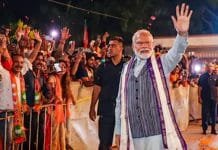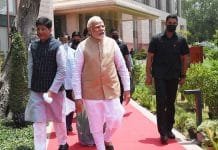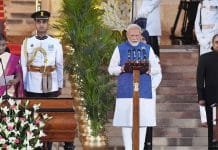INVC NEWS Islamabad – In a fiery exchange in the National Assembly of Pakistan, a Member of Parliament (MP) publicly labeled Prime Minister Shahbaz Sharif as a coward, criticizing his unwillingness to mention India’s Prime Minister, Narendra Modi, by name. This scathing remark has ignited debates within political circles, as tensions between India and Pakistan continue to escalate.
MP’s Criticism of PM Sharif: A Coward and Jackal?
The MP, addressing the parliamentarians, pointed out that despite Pakistan’s growing security situation, PM Shahbaz Sharif has failed to directly acknowledge the actions of PM Modi or address India’s military actions against Pakistan. According to the MP, this omission undermines the credibility of Pakistan’s leadership, particularly when the country’s armed forces are on high alert along the border.
The MP’s words were sharp: “If a leader is a lion, but his army is led by jackals, they fight bravely. But if the leader is a jackal, the whole army fights like jackals and loses the battle.” This analogy, referring to Tipu Sultan’s famous quote, was aimed squarely at PM Sharif, accusing him of lacking the courage to stand firm against India.
Unwillingness to Name Modi Amid Escalating Tensions
The heated exchange raised questions about Pakistan’s strategic response in the ongoing India-Pakistan conflict. With Indian military forces launching drone and missile strikes in Pakistan-occupied Kashmir (PoK) and Lahore, as well as targeting air defense systems, the MP criticized the PM for not addressing Modi directly. “Our soldiers stand at the border, and if our PM cannot even name Modi, what message does it send?” the MP asked.
India’s actions, including the destruction of strategic infrastructure like the Lahore air defense system, highlight the growing militarization and cross-border tensions between the two nations. Drone attacks have also been reported in multiple cities across Pakistan, signaling an increasingly aggressive stance from India in retaliation to the provocations.
Escalating India-Pakistan Conflict: Airstrike Warnings and Military Actions
As tensions continue to mount, India has been carrying out airstrikes and missile attacks in response to Pakistan’s military provocations. On Wednesday and Thursday, India targeted critical air defense installations in Lahore, signaling a shift in India’s strategy to combat the rising threat from across the border. The Indian Defense Ministry has also been actively monitoring developments, with a high-level meeting led by Defense Minister Rajnath Singh.
Meanwhile, Indian Border Security Force (BSF) troops killed seven terrorists in Samba, Jammu and Kashmir, highlighting the ongoing skirmishes in the region. These operations come amid escalating fears of further military escalation. Chandigarh and Ambala have been put on high alert, with airstrike warnings in place for Friday. Additionally, villages within a 20-kilometer radius of the Rajasthan border have been evacuated as a precautionary measure.
Pakistan on High Alert Amid National Crisis
As Pakistan braces for more military confrontation, the situation remains precarious. The ongoing tension has sparked not only political disputes within the Pakistani parliament but also widespread public concern about the country’s security. The failure of the Pakistani leadership to address the situation directly has led to growing frustration, especially among military personnel stationed at the border.
The country’s political instability, coupled with India’s strategic military strikes, continues to fuel anxieties about the potential for a larger, more destructive conflict. The unfolding events highlight the fragile peace between the two nuclear-armed nations, and the situation remains fluid.















